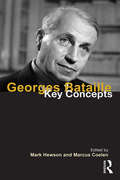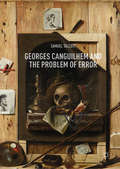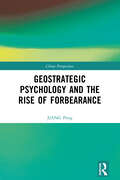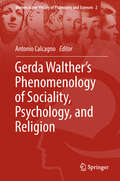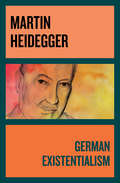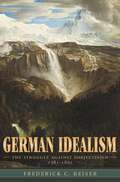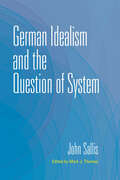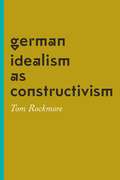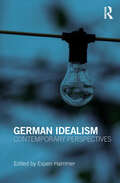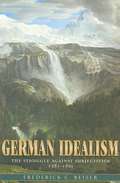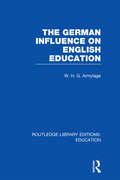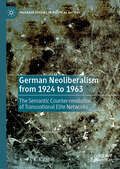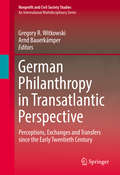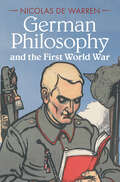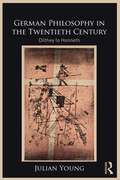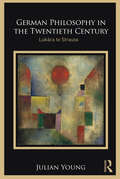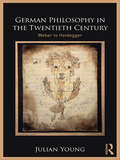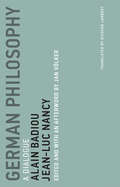- Table View
- List View
Georges Bataille: Key Concepts (Key Concepts)
by Mark Hewson Marcus CoelenGeorges Bataille (1897 - 1962) was a philosopher, writer, and literary critic whose work has had a significant impact across disciplines as diverse as philosophy, sociology, economics, art history and literary criticism, as well as influencing key figures in post-modernist and post-structuralist philosophy such as Jacques Derrida and Michel Foucault. In recent years, the number of works published on Georges Bataille, as well as the variety of contexts in which his work is invoked, has markedly increased. In Georges Bataille: Key Concepts an international team of contributors provide an accessible introduction to and survey of Bataille's thought. The editors’ introduction provides an overview of Bataille’s work, while the chapters in the first section cover the social, political, artistic and philosophical contexts that shaped his thought. In the second part, each chapter engages with a key theme in Bataille’s philosophy, including: art, eroticism, evil, inner experience, heterology, religion, sacrifice, and sovereignty. The final chapter addresses Bataille’s literary writings. Georges Bataille: Key Concepts is an invaluable guide for students from across the Humanities and Social Sciences, coming to Bataille’s work for the first time. Contributors: Giulia Agostini, Elisabeth Arnould-Bloomfield, Tiina Arppe, Marcus Coelen, Simonetta Falasca-Zamponi, Patrick ffrench, Marina Galletti, Nadine Hartmann, Mark Hewson, Andrew Hussey, Stuart Kendall, Claire Nioche, Gerhard Poppenberg, and Michèle Richman.
Georges Canguilhem and the Problem of Error
by Samuel TalcottExamining Georges Canguilhem’s enduring attention to the problem of error, from his early writings to Michel Foucault’s first major responses to his work, this pathbreaking book shows that the historian of science was also a centrally important philosopher in postwar France. Samuel Talcott elucidates Canguilhem’s contributions by drawing on previously neglected publications and archival sources to trace the continuity of commitment that led him to alter his early anti-vitalist, pacifist positions in the face of political catastrophe and concrete human problems. Talcott shows how Canguilhem critically appropriated the philosophical work of Alain, Bergson, Bachelard, and many others while developing his own distinct writings on medicine, experimentation, and scientific concepts in an ethical and political endeavor to resist alienation and injustice. And, while suggesting Canguilhem’s sometimes surprising philosophical importance for a range of younger thinkers, the book demonstrates Foucault’s own critical allegiance to Canguilhem’s spirit, techniques, and investigations.
Georges de La Tour and the Enigma of the Visible
by Dalia JudovitzNot rediscovered until the twentieth century, the works of Georges de La Tour retain an aura of mystery. At first sight, his paintings suggest a veritable celebration of light and the visible world, but this is deceptive. The familiarity of visual experience blinds the beholder to a deeper understanding of the meanings associated with vision and the visible in the early modern period.By exploring the representations of light, vision, and the visible in La Tour’s works, this interdisciplinary study examines the nature of painting and its artistic, religious, and philosophical implications. In the wake of iconoclastic outbreaks and consequent Catholic call for the revitalization of religious imagery, La Tour paints familiar objects of visible reality that also serve as emblems of an invisible, spiritual reality. Like the books in his paintings, asking to be read, La Tour’s paintings ask not just to be seen as visual depictions but to be deciphered as instruments of insight. In figuring faith as spiritual passion and illumination, La Tour’s paintings test the bounds of the pictorial image, attempting to depict what painting cannot ultimately show: words, hearing, time, movement, changes of heart.La Tour’s emphasis on spiritual insight opens up broader artistic, philosophical, and conceptual reflections on the conditions of possibility of the pictorial medium. By scrutinizing what is seen and how, and by questioning the position of the beholder, his works revitalize critical discussion of the nature of painting and its engagements with the visible world.
Geostrategic Psychology and the Rise of Forbearance (China Perspectives)
by JIANG PengBased on the framework of geostrategic psychology, this book elucidates the intrinsic law of the rise and fall of great powers and gives insights into the quandary of China's rise and the mechanism behind the strategy.Conflating geopolitics and strategic psychology, geostrategic psychology is rooted in the historical study of strategy and premised on an assumption that human beings bear resemblance in psychology and behavior when facing the same structure of geopolitical circumstance. The book analyzes intriguing phenomena from strategic psychology, including trend anxiety and conflict willingness, the Old Man Phenomenon in international politics, the Santa Claus Effect, the Myth of the Sunk Cost Fallacy, Bidder Myth, Gambler's Game, Philip Trap, William's Dilemma, Heartland Myth, Domino's Fear, Golden Nation Myth, Alliance Commitment Dilemma and Corinthian Dilemma among others. The author combines theory, history and the practice of international politics, revealing how a nation can occupy a favorable position in the field of global strategic competition and prospects for China.The title will be a valuable reference for observers of international politics as well as researchers and students interested in international relations, international politics, geopolitics, strategic psychology and geostrategic psychology.
Gerda Walther’s Phenomenology of Sociality, Psychology, and Religion (Women in the History of Philosophy and Sciences #2)
by Antonio CalcagnoThis book explores the philosophical writings of Gerda Walther (1897–1977). It features essays thatrecover large parts of Walther’s oeuvre in order to show her contribution to phenomenologyand philosophy. In addition, the volume contains an English translation of part of hermajor work on mysticism.The essays consider the interdisciplinary implications of Gerda Walther’s ideas. A student of Edmund Husserl, Edith Stein, and Alexander Pfänder, she wrotefoundational studies on the ego, community, mysticism and religion, and consciousness.Her discussions of empathy, identification, the ego and ego-consciousness,alterity, God, mysticism, sensation, intentionality, sociality, politics, and woman arerelevant not only to phenomenology and philosophy but also to scholars of religion, women’s and gender studies, sociology, political science, and psychology.Gerda Walther was one of the important figures of the early phenomenologicalmovement. However, as a woman, she could not habilitate at a Germanuniversity and was, therefore, denied a position. Her complete works have yet to bepublished. This ground-breaking volume not only helps readers discover a vital voice but it also demonstrates the significant contributions of women to early phenomenological thinking.
German Existentialism
by Martin HeideggerThese pro-Nazi speeches by the author Being and Time are collected here to demonstrate the truly dark and shameful turn taken by the eminent philosopher. &“On the day of German Labor, on the day of the Community of the People, the Rector of Freiburg University, Dr. Martin Heidegger, made his official entry into the National Socialist Party.&” And so begins one of the most controversial texts available today. Heidegger, a German Nationalist and proud Nazi, thoroughly examines the history, the philosophy, and the rise to power of the Nazi movement in Germany. Martin Heidegger&’s distinguished Italian colleague, Professor Benedetto Croce, said of his German contemporary, &“This man dishonors philosophy and that is an evil for politics too.&” Croce&’s severe rebuke was not singular at the time when Hitlerism was rampant over Europe. It is true that among the almost one thousand professional philosophers of Germany and Austria only very few actively opposed National Socialism. On the other hand, no one degraded his history profession in the way that Heidegger did, by becoming a spokesman for National socialism and attempting to mold his theories into one pattern with Hitlerism.
German Idealism
by Frederick C. BeiserOne of the very few accounts in English of German idealism, this ambitious work advances and revises our understanding of both the history and the thought of the classical period of German philosophy. As he traces the structure and evolution of idealism as a doctrine, Frederick Beiser exposes a strong objective, or realist, strain running from Kant to Hegel and identifies the crucial role of the early romantics--Hölderlin, Schlegel, and Novalis--as the founders of absolute idealism. Traditionally, German idealism is understood as a radical form of subjectivism that expands the powers of the self to encompass the entire world. But Beiser reveals a different--in fact, opposite--impulse: an attempt to limit the powers of the subject. Between Kant and Hegel he finds a movement away from cosmic subjectivity and toward greater realism and naturalism, with one form of idealism succeeding another as each proved an inadequate basis for explaining the reality of the external world and the place of the self in nature. Thus German idealism emerges here not as a radical development of the Cartesian tradition of philosophy, but as the first important break with that tradition.Table of Contents: Introduction 1. Realism in German Idealism 2. Exorcising the Spirit 3. The Critique of Foundationalism 4. The Troublesome Hegelian Legacy 5. The Taxonomy of German Idealism I. KANT'S CRITIQUE OF IDEALISM Introduction: Kant and the Problem of Subjectivism 1. The Clash of Interpretations 2. Method and Results 3. Contemporary Kant Scholarship 1. Idealism in the Precritical Years 1. The Idealist Challenge 2. The First Refutation of Idealism 3. Idealist Dreams and Visions 4. The Critique of Idealism in the Inaugural Dissertation 5. Skeptical Ambivalence 6. David Hume, Transcendental Realist 2. Transcendental Idealism and Empirical Realism 1. The Case for Subjectivism 2. The First Edition Definitions of Transcendental Idealism 3. Transcendental versus Empirical Idealism 4. Empirical Realism in the Aesthetic 5. Empirical Realism and Empirical Dualism 3. The First Edition Refutation of Skeptical Idealism 1. The Priority of Skeptical Idealism 2. The Critique of the Fourth Paralogism 3. The Proof of the External World 4. A Cartesian Reply 5. Appearances and Spatiality 6. The Ambiguity of Transcendental Idealism 7. The Coherence of Transcendental Idealism 4. The First Edition Refutation of Dogmatic Idealism 1. The Missing Refutation 2. Kant's Interpretation of Leibniz 3. The Dispute in the Aesthetic 4. Dogmatic Idealism in the Antinomies 5. Kant and Berkeley 1. The Göttingen Review 2. Kant's Reaction 3. Berkeleyianism in the First Edition of the Kritik 4. The Argument of the Prolegomena 5. Kant's Interpretation of Berkeley 6. The Small but Real Differences? 6. The Second Edition Refutation of Problematic Idealism 1. The Problem of Interpretation 2. Kant's Motives 3. The Question of Kant's Realism 4. Realism in the Refutation 5. The New Strategy 6. The Argument of the Refutation 7. Outer vis-à-vis Inner Sense 8. Kant's Refutations in the Reflexionen, 1788-93 7. Kant and the Way of Ideas 1. The Theory of Ideas 2. Loyalty and Apostasy 3. The Transcendental versus the Subjective 4. The Question of Consistency 5. The Doctrine of Inner Sense 6. Kantian Self-Knowledge and the Cartesian Tradition 8. The Transcendental Subject 1. Persistent Subjectivism 2. Eliminating the Transcendental Subject 3. The Criteria of Subjectivity 4. The Subjectivity of the Transcendental 5. Restoring the Transcendental Subject 9. The Status of the Transcendental 1. The Problematic Status of the Categories 2. The Metaphysial Interpretation 3. The Psychological Interpretation 4. The Logical Interpretation 5. The Ineliminable Psychological Dimension 6. Problems of Transcendental Psychology 7. Transcendental Psychology and Transcendental Idealism 10. Kant's Idealism in the Opus postumum 1. Kant's Peruke 2. The Gap in the Critical System 3. The Transition Program and Its Implications 4. The Transition and Refutation 5. The Selbstsetzungslehre 6. Appearance of Appe...
German Idealism and the Concept of Punishment
by Joseph J. Kominkiewicz Frances BrownAgainst the background of early modernism - a period that justified punishment by general deterrence - Kant is usually thought to represent a radical turn towards retributivism. For Kant, and later for Fichte and Hegel, a just punishment respects the humanity inherent in the criminal, and serves no external ends - it is instituted only because the criminal deserves it. In this original study, Jean-Christophe Merle uses close analysis of texts to show that these philosophers did not in fact hold a retributivist position, or even a mixed position; instead he traces in their work the gradual emergence of views in favour of deterrence and resocialisation. He also examines Nietzsche's view that morality rests on the rejection of retribution. His final chapter offers a challenge to the retributivist position, and a defence of resocialisation, in the context of current legal theory and practice concerning the punishment of crimes against humanity.
German Idealism and the Jew: The Inner Anti-Semitism of Philosophy and German Jewish Responses
by Michael MackIn German Idealism and the Jew, Michael Mack uncovers the deep roots of anti-Semitism in the German philosophical tradition. While many have read German anti-Semitism as a reaction against Enlightenment philosophy, Mack instead contends that the redefinition of the Jews as irrational, oriental Others forms the very cornerstone of German idealism, including Kant's conception of universal reason. Offering the first analytical account of the connection between anti-Semitism and philosophy, Mack begins his exploration by showing how the fundamental thinkers in the German idealist tradition—Kant, Hegel, and, through them, Feuerbach and Wagner—argued that the human world should perform and enact the promises held out by a conception of an otherworldly heaven. But their respective philosophies all ran aground on the belief that the worldly proved incapable of transforming itself into this otherworldly ideal. To reconcile this incommensurability, Mack argues, philosophers created a construction of Jews as symbolic of the "worldliness" that hindered the development of a body politic and that served as a foil to Kantian autonomy and rationality. In the second part, Mack examines how Moses Mendelssohn, Heinrich Heine, Franz Rosenzweig, and Freud, among others, grappled with being both German and Jewish. Each thinker accepted the philosophies of Kant and Hegel, in varying degrees, while simultaneously critiquing anti-Semitism in order to develop the modern Jewish notion of what it meant to be enlightened—a concept that differed substantially from that of Kant, Hegel, Feuerbach, and Wagner. By speaking the unspoken in German philosophy, this book profoundly reshapes our understanding of it.
German Idealism and the Question of System (The Collected Writings of John Sallis)
by John SallisThis volume in the Collected Writings of John Sallis presents his lecture course on German Idealism, tracing its development from the reception of Kant through the works of Fichte and Schelling. With insightful interpretations of key texts, John Sallis demonstrates the enduring power of post-Kantian thought—especially with respect to freedom, the relation of subject to object, and the role of the imagination. He shows that what underlies the development of German Idealism is a concern with the question of system and the nature of philosophy itself.The book begins with a treatment of Kant's philosophy and its new beginning. It then discusses the initial reception of Kant's philosophy, showing how criticisms of Kant set the stage for the subsequent development of German Idealism. The central chapters focus on Fichte, first introducing his central philosophical project (the Wissenschaftslehre) and then carefully analyzing its implementation in the 1794 Grundlage. The final chapters treat Schelling's early and middle philosophy, including the 1800 System of Transcendental Idealism and his famous 1809 treatise on freedom.Beyond its insights into the thought of German Idealism, the book is distinctive for the clarity of Sallis's exposition, his attention to the implications for philosophy today, and the sense of wonder he evokes in his readers. Because of these features, the book will be of interest to general readers as well as specialists in German philosophy.
German Idealism as Constructivism
by Tom RockmoreGerman Idealism as Constructivism is the culmination of many years of research by distinguished philosopher Tom Rockmore—it is his definitive statement on the debate about German idealism between proponents of representationalism and those of constructivism that still plagues our grasp of the history of German idealism and the whole epistemological project today. Rockmore argues that German idealism—which includes iconic thinkers such as Kant, Fichte, Schelling, and Hegel—can best be understood as a constructivist project, one that asserts that we cannot know the mind-independent world as it is but only our own mental construction of it. Since ancient Greece philosophers have tried to know the world in itself, an effort that Kant believed had failed. His alternative strategy—which came to be known as the Copernican revolution—was that the world as we experience and know it depends on the mind. Rockmore shows that this project was central to Kant’s critical philosophy and the later German idealists who would follow him. He traces the different ways philosophers like Fichte, Schelling, and Hegel formulated their own versions of constructivism. Offering a sweeping but deeply attuned analysis of a crucial part of the legacy of German idealism, Rockmore reinvigorates this school of philosophy and opens up promising new avenues for its study.
German Idealism's Trinitarian Legacy
by Dale M. SchlittDale M. Schlitt presents a study of trinitarian thought as it was understood and debated by the German Idealists broadly—engaging Schelling's philosophical interpretations of Trinity as well as Hegel's—and analyzing how these Idealist interpretations influenced later philosophers and theologians. Divided into different sections, one considers nineteenth-century central Europeans Philipp Marheineke, Isaak August Dorner, and Vladimir Sergeyevich Solovyov under the rubric "testimonials." Another section studies twentieth-century Germans Karl Barth, Karl Rahner, and Wolfhart Pannenberg, who share "family resemblances" with the Idealists, and a third addresses the work of twentieth- and twenty-first century Americans, Robert W. Jenson, Catherine Mowry LaCugna, Joseph A. Bracken, and Schlitt himself, whose work reverberates with what Schlitt terms "transatlantic Idealist echoes." The book concludes with reflection on the overall German Idealist trinitarian legacy, noting several challenges it offers to those who will pursue creative trinitarian reflection in the future.
German Idealism: Contemporary Perspectives
by Espen HammerThis outstanding collection of specially commissioned chapters examines German idealism from several angles and assesses the renewed interest in the subject from a wide range of fields. Including discussions of the key representatives of German idealism such as Kant, Fichte and Hegel, it is structured in clear sections dealing with: metaphysics the legacy of Hegel’s philosophy Brandom and Hegel recognition and agency autonomy and nature the philosophy of German romanticism. Amongst other important topics, German Idealism: Historical and Philosophical Perspectives addresses the debates surrounding the metaphysical and epistemological legacy of German idealism; its importance for understanding recent debates in moral and political thought; its appropriation in recent theories of language and the relationship between mind and world; and how German idealism affected subsequent movements such as romanticism, pragmatism, and critical theory. Contributors: Espen Hammer, Stephen Houlgate, Sebastian Gardner, Paul Redding, Andrew Bowie, Richard Eldridge, Jay Bernstein, Frederick Beiser, Paul Franks, Robert Pippin, Fred Rush, Manfred Frank, Terry Pinkard, Robert Stern
German Idealism: The Struggle against Subjectivism 1781-1801
by Frederick C. BeiserThis work advances and revises our understanding of both the history and the thought of the classical period of German philosophy.
German Ideology: Including Thesis on Feuerbach
by Karl MarxNearly two years before his powerful Communist Manifesto, Marx (1818-1883) co-wrote The German Ideology in 1845 with friend and collaborator Friedrich Engels expounding a new political worldview, including positions on materialism, labor, production, alienation, the expansion of capitalism, class conflict, revolution, and eventually communism. They chart the course of "true" socialism based on Hegel''s dialectic, while criticizing the ideas of Bruno Bauer, Max Stirner, and Ludwig Feuerbach. Marx expanded his criticism of the latter in his now famous Theses on Feuerbach, found after Marx''s death and published by Engels in 1888. Introduction to the Critique of Political Economy, also found among the posthumous papers of Marx, is a fragment of an introduction to his main works. Combining these three works, this volume is essential for an understanding of Marxism.
German Influence on English Education (Routledge Library Editions: Education)
by W H ArmytageThis book traces the impact of German educationists, such as Froebel and Herbart, on practice in Britain while stressing the important and lasting influence of German scientists, technologists, philosophers, sociologists and historians on our educational system. This record of interplay between the two countries shows not only the influence of German innovations but also the effect on British education of the many German émigrés in the last two hundred years.
German Migrants in Post-War Britain: An Enemy Embrace (British Politics and Society)
by Dr Inge Weber-Newth Johannes-Dieter SteinertBoth timely and topical, with 2005 marking the 60th anniversary of the end of the Second World War, this unique book examines the little-known and under-researched area of German migration to Britain in the immediate post-war era. Authors Weber-Newth and Steinert analyze the political framework of post-war immigration and immigrant policy, and the complex decision-making processes that led to large-scale labour migration from the continent. They consider: * identity, perception of self and others, stereotypes and prejudice* how migrants dealt with language and intercultural issues* migrants' attitudes towards national socialist and contemporary Germany* migrants' motivation for leaving Germany* migrants' initial experiences and their reception in Britain after the war, as recalled after 50 years in the host country, compared to their original expectations. Based on rich British and German governmental and non-governmental archive sources, contemporary newspaper articles and nearly eighty biographically–oriented interviews with German migrants, this outstanding volume, a must-read for students and scholars in the fields of social history, sociology and migration studies, expertly encompasses political as well as social-historical questions and engages with the social, economic and cultural situation of German immigrants to Britain from a life-historical perspective.
German Migrants in Post-War Britain: An Enemy Embrace (British Politics and Society)
by Dr Inge Weber-Newth Johannes-Dieter SteinertBoth timely and topical, with 2005 marking the 60th anniversary of the end of the Second World War, this unique book examines the little-known and under-researched area of German migration to Britain in the immediate post-war era. Authors Weber-Newth and Steinert analyze the political framework of post-war immigration and immigrant policy, and the complex decision-making processes that led to large-scale labour migration from the continent. They consider:* identity, perception of self and others, stereotypes and prejudice* how migrants dealt with language and intercultural issues* migrants' attitudes towards national socialist and contemporary Germany* migrants' motivation for leaving Germany* migrants' initial experiences and their reception in Britain after the war, as recalled after 50 years in the host country, compared to their original expectations.Based on rich British and German governmental and non-governmental archive sources, contemporary newspaper articles and nearly eighty biographically–oriented interviews with German migrants, this outstanding volume, a must-read for students and scholars in the fields of social history, sociology and migration studies, expertly encompasses political as well as social-historical questions and engages with the social, economic and cultural situation of German immigrants to Britain from a life-historical perspective.
German Neoliberalism from 1924 to 1963: The Semantic Counter-revolution of Transnational Elite Networks (Palgrave Studies in Political History)
by Arne I. KäthnerThis book offers an in-depth study of German neoliberalism between 1924 and 1963, arguing that a neoliberal network was established in the interwar period, decades before elite networks in Great Britain and the United States fostered the ‘neoliberal revolution’ of the Thatcher and Reagan administrations. The author shows how this network strongly influenced societal developments in the 1950s and set a precedent for neoliberal projects in other countries. This success was largely due to the deliberate and strategic reorganisation of the semantic field: abandoning or reacquiring ‘abused’ concepts, challenging existing meanings, or introducing new concepts to the political scene. The book examines the Aktionsgemeinschaft Soziale Marktwirtschaft (ASM), an early neoliberal Think Tank founded in 1953 and led by Alexander Rüstow, which became an influential political actor in post-war West Germany. The author adopts a decidedly transnational approach linking and contrasting inner-German debates with those taking place transnationally among neoliberal proponents in the Mont Pèlerin Society. More than just a political study of ideologies, this book provides a historical account of the conceptual struggles over neoliberalism, the actors who engaged in them, the spheres in which they took place, and the semantic means and conceptual strategies employed, providing useful insights for scholars of German and political history, as well as political science more generally.
German Philanthropy in Transatlantic Perspective
by Gregory R. Witkowski Arnd BauerkämperThis volume examines philanthropic practices against the backdrop of the continuities, disruptions and changes in twentieth century German socio-political relations. It presents a differentiated understanding of the relationship between philanthropy and civil society that traces this connection from Germany's first democracy, the Weimar Republic, through the Nazi dictatorship and Soviet-style rule in Communist East Germany to the stable democracy of the Federal Republic of Germany. While concentrating on Germany, this volume places German philanthropy in a triangular relationship with the United States and the developing world, primarily through Africa. In particular, the contributions to the book demonstrate that despite many transatlantic exchanges between German and American philanthropic organizations, these relationships should not be reduced to bilateral exchanges but rather seen in the context of a globalizing world. More generally, this transnational study is a reminder that philanthropic activities need to be placed into their specific historical contexts. Such an analytical framework allows for more dynamic understanding of the meaning of philanthropy in society, illustrating both enduring and changing practices.
German Philosophy and the First World War
by Nicolas de WarrenHow did the First World War, the so-called 'Great War' - widely seen on all sides as 'the war to end all wars' - impact the development of German philosophy? Combining history and biography with astute philosophical and textual analysis, Nicolas de Warren addresses here the intellectual trajectories of ten significant wartime philosophers: Ernst Bloch, Martin Buber, Ernst Cassirer, Hermann Cohen, György Lukács, Martin Heidegger, Edmund Husserl, Franz Rosenzweig, Max Scheler and Georg Simmel. In exploring their individual works written during and after the War, the author reveals how philosophical concepts and new forms of thinking were forged in response to this unprecedented catastrophe. In reassessing standardized narratives of German thought, the book deepens and enhances our understanding of the intimate and complex relationship between philosophy and violence by demonstrating how the 1914-18 conflict was a crucible for ways of thinking that still define us today.
German Philosophy in the Twentieth Century: Dilthey to Honneth
by Julian YoungThe path taken by German philosophy in the twentieth century is one of the most exciting and controversial in the history of human thought, by turns radical and conservative and secular and religious. In this outstanding introduction, German Philosophy in the Twentieth Century: Dilthey to Honneth—the third and final volume in his trilogy—Julian Young examines the work of eight German philosophers and theologians of the period. He discusses their engagement with the deepest existential questions, their critique of the rationalization and mechanization of modernity, and their commitment to varying forms of liberalism, socialism, and democracy. Young introduces and assesses the thought of the following figures: Wilhelm Dilthey: the need for ‘worldviews’, and the distinction between ‘explanation’ and ‘understanding’ as a bulwark against the reduction of human beings to scientific quanta Karl Jaspers: existentialism, the challenge of nihilism, and the turn to theology Edith Stein: the phenomenology of empathy, community versus society, and the turn to Catholicism Paul Tillich: philosophical theology and the ‘theonomous’ life Martin Buber: recovering the ‘thou’ in the face of modernity’s reduction of everything to an ‘it’; the kibbutz as the paradigm of a socialist community Hans Jonas: the mortal threat posed by the unknown consequences of modern technology and the ethics of responsibility for the planet Erich Fromm: the ‘art of loving’ as a bulwark against hard and soft totalitarianism; the replacement of capitalism by communitarian socialism Axel Honneth: contemporary Hegelianism and the ethics and politics of recognition; the nature of real freedom. Lucidly and engagingly written, German Philosophy in the Twentieth Century: Dilthey to Honneth is essential reading for students of German philosophy, phenomenology, and theology and will also be of interest to students in related fields such as literature, political theory, and sociology. German Philosophy in the Twentieth Century: Weber to Heidegger (2018) and German Philosophy in the Twentieth Century: Lukács to Strauss (2020) are also available from Routledge.
German Philosophy in the Twentieth Century: Lukács to Strauss
by Julian YoungThe course of German philosophy in the twentieth century is one of the most exciting and controversial in the history of human thought. In this outstanding and engaging introduction, a companion volume to his German Philosophy in the Twentieth Century: Weber to Heidegger, Julian Young examines and assesses the way in which some of the major German thinkers of the period reacted, often in starkly contrasting ways, to the challenges posed by the nature of modernity, the failure of liberalism and the concept of decline. Divided into two parts exploring major intellectual figures of the left and right respectively, Young introduces and assesses the thought of the following figures: Georg Lukács: the critique of capitalism: alienation, reification, and false consciousness Ernst Bloch: the Marxist utopia Walter Benjamin: the confluence of phenomenology and left-wing thought: the Arcades Project, aura, and the technological reproduction of the artwork Oswald Spengler: the pessimistic right and the concept of Western decline Max Scheler: Catholic conservatism and the ‘objective hierarchy of values’ Carl Schmitt: the failure of liberalism, dictatorship, ‘friends’ versus ‘enemies’ Leo Strauss: the rejection of moral relativism and the return to classical philosophy. Highly relevant when the viability of liberal democracy is again called into question, German Philosophy in the Twentieth Century: Lukacs to Strauss is essential reading for students of German philosophy, phenomenology and critical theory, and will also be of interest to students in related fields such as literature, religious studies, and political theory.
German Philosophy in the Twentieth Century: Weber to Heidegger
by Julian YoungThe course of German philosophy in the twentieth century is one of the most exciting, diverse and controversial periods in the history of human thought. It is widely studied and its legacy hotly contested. In this outstanding introduction, Julian Young explains and assesses the two dominant traditions in modern German philosophy – critical theory and phenomenology – by examining the following key thinkers and topics: Max Weber’s setting the agenda for modern German philosophy: the ‘rationalization’ and ‘disenchantment’ of modernity resulting in ‘loss of freedom’ and ‘loss of meaning’ Horkheimer and Adorno: rationalization and the ‘culture industry’ Habermas’ defence of Enlightenment rationalization, the ‘unfinished project of modernity’ Marcuse: a Freud-based vision of a repression-free utopia Husserl: overcoming the ‘crisis of humanity’ through phenomenology Early Heidegger’s existential phenomenology: ‘authenticity’ as loyalty to ‘heritage’ Gadamer and ‘fusion of horizons’ Arendt: the human condition Later Heidegger: the re-enchantment of reality. German Philosophy in the Twentieth Century: Weber to Heidegger is essential reading for students of German philosophy, phenomenology and critical theory, and will also be of interest to students in related fields such as literature, religious studies, and political theory.
German Philosophy: A Dialogue (Untimely Meditations #11)
by Alain Badiou Jean-Luc NancyTwo eminent French philosophers discuss German philosophy—including the legacy of Kant, Hegel, Nietzsche, Adorno, Fichte, Marx, and Heidegger—from a French perspective. In this book, Alain Badiou and Jean-Luc Nancy, the two most important living philosophers in France, discuss German philosophy from a French perspective. Written in the form of a dialogue, and revised and expanded from a 2016 conversation between the two philosophers at the Universität der Künste Berlin, the book offers not only Badiou's and Nancy's reinterpretations of German philosophers and philosophical concepts, but also an accessible introduction to the greatest thinkers of German philosophy. Badiou and Nancy discuss and debate such topics as the legacies of Kant, Hegel, and Marx, as well as Nietzsche, Adorno, Fichte, Schelling, and the unavoidable problem of Heidegger and Nazism. The dialogue is contentious, friendly, and often quotable, with strong—at times passionate—positions taken by both Badiou and Nancy, who find themselves disagreeing over Kant, for example, and in unexpected agreement on Marx, for another. What does it mean, then, to conduct a dialogue on German philosophy from a French perspective? As volume editor Jan Völker observes, “German philosophy” and “French philosophy” describe complex constellations that, despite the reference to nation-states and languages, above all encompass shared concepts and problems—although these take a range of forms. Perhaps they can reveal their essential import only in translation.
